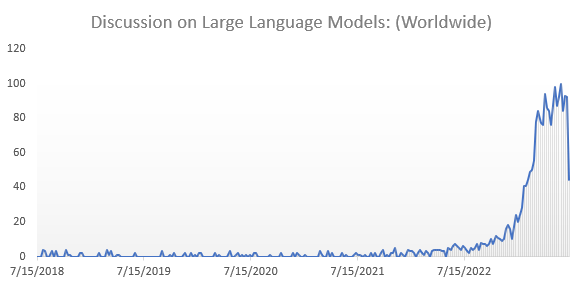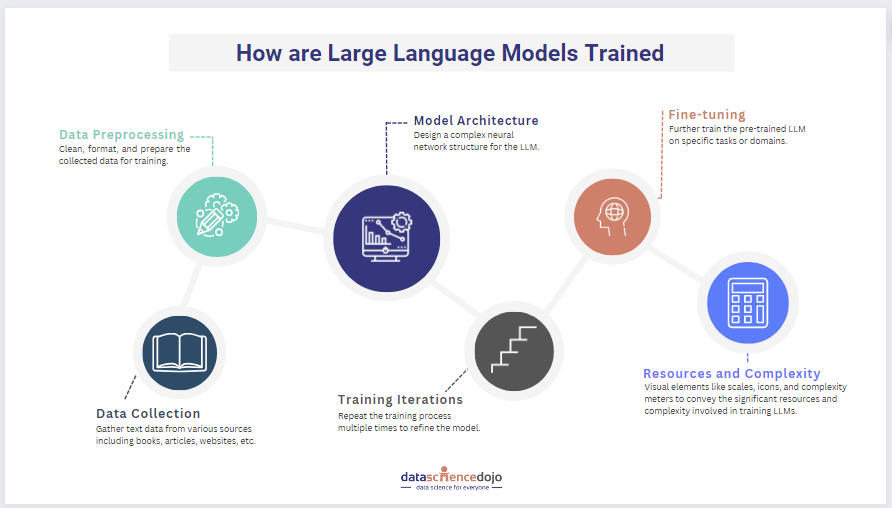Welcome to Data Science Dojo’s weekly newsletter, The Data-Driven Dispatch!
This week, we introduce you to what’s inside ChatGPT’s brain. Yes, we are talking about Large Language Models (LLMs), a buzzword that seems to have made the world go wild and drive social progress.
We’ll dive into the core significance of LLMs, their potential to revolutionize our present reality, and uncover pathways to embark on a captivating career in large language models vicinity.
We know you’re excited, so let’s head straight to the big picture.
What Are Large Language Models?
A large language model, referred to as an LLM, is an advanced machine learning algorithm capable of identifying, condensing, translating, predicting, and generating various forms of text and content using extensive datasets. And, by extensive, we mean datasets reaching up to 100 trillion parameters.
We’d recommend reading this article for a more holistic overview of LLMs.
Large language models: A beginner’s guide to the decade’s top technology
If you want to share your knowledge about LLMs and its impact, write to us.

What Makes LLMs so Important?
When you play doctor with Google and look up your symptoms, it unleashes a barrage of possible ailments like a symphony of medical mysteries. You might discover that a mere cough could simply be the common cold serenading your throat, or in a dramatic twist, an operatic performance by the Cancer.
However, it’s important to note that Google’s role in this context is limited to making possible predictions, while the final judgment remains with humans. This is where LLMs make a significant difference.
LLMs are crucial because they excel not only in making accurate predictions but also the incorporation of human judgment into those predictions. This aspect enhances their usefulness and safety. LLMs achieve this capability by being trained on an extensive corpus of human-generated text.
How Large Language Models Reflect Human Judgment
This means that LLMs can be used to create tools that help people make better decisions. For example, an LLM could be used to create a tool that helps people choose the right medicine given their particular medical condition.
Here are some articles about how LLMs can revolutionize different industries.
- How can LLMs help non-profits?
- How can LLMs aid the financial industry?
- How can LLMs revolutionize healthcare?
Training Process of LLMs
The training process of Large Language Models (LLMs) involves a series of crucial steps that contribute to their remarkable capabilities in understanding and generating human-like text. Here’s a quick run-down of steps involved in the making of an LLM.
The LLMs are fine-tuned to perform specific tasks or domains by further training them on task-specific data such as medical or legal domains.
If you are looking for more data science infographics, follow us on Instagram.
Don’t fret over information overload from large language models! Sit back and enjoy this lighthearted meme featuring the conversation of a normal distribution with skewed distribution.
After all, we cannot behave normally, can we?
Follow us on Threads for more humorous content related to data and AI.
LLMs for Real-world Applications and Social Progress
Let’s get going. We have already discussed what makes LLMs so important to the world. Now, let’s hear from an expert about the real-world applications of LLMs.
This talk provides a beginner-friendly and engaging overview of Large Language Models and their real-world applications. Presented by Hemant Jain, an expert in machine learning, this session offers valuable insights into the potential of LLMs.
For more information about LLMs and AI, visit our YouTube page.
Large Language Models Bootcamp
Wrapping up, LLMs are complex models that require a solid understanding of Generative AI concepts, and methodologies to effectively work with them. Here’s an article that will give you an overview of essential skills you need to know.
If you are interested in LLMs, you might want to explore our Large Language Models Bootcamp to kickstart your tech career. The Bootcamp will equip you with the necessary skills including prompt engineering, vector databases, transformers, fine-tuning, and much more.
If you want to network with data science experts, join our LinkedIn and Twitter communities.







